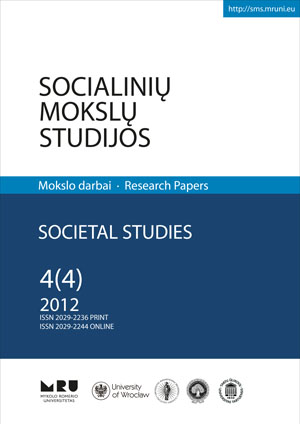Kodėl sunku kalbėti apie Europos tapatybę?
Why is it Difficult to Speak About European Identity?
Author(s): Povilas AleksandravičiusSubject(s): Social Sciences
Published by: Mykolas Romeris University
Keywords: European identity; culture; ethics; substance; crisis; person; universality
Summary/Abstract: The article names the key difficulties that arise when contemplating the problem of European identity and indicates the ways of overcoming those difficulties. All difficulties are grouped into two categories: conditional difficulties, resolved when approaching European identity from a certain point of view or introducing some additional concepts, and fundamental difficulties constitutive of European identity, therefore, they are permanent as well as their defiance. Identifying geographical European definition is in the first category of difficulties as well as the issue of cultural diversity, the role of Christianity, rejection of European identity because of moral motives and certain epistemological principles. European geographical boundaries are posing the relativity of this understanding: on the one hand, they can be drawn consulting climatologic criteria of determination of geographical boundaries, but on the other hand, indefiniteness of European boundaries only emphasize the true meaning of European identity – it is of spiritual, not of geographical nature. The absence of cultural variety and the unifying narrative raises a more complex problem, but it can be solved by creating a certain new narrative which could take root in the European history of the latter century and could use a special kind of a hermeneutical key – “a memory dialogue“, empowered by the most characteristic European mentality feature – the ability to transcendent itself (“trans” function). The role of Christianity in European identity is also problematic, but it can be determined without approaching Christianity as an original system of values or truths, one of many systems in the world and in Europe, instead it can be seen as a way of thinking, enabling the aforementioned ability to transcendent oneself. Difficulties of moral character while speaking about European identity, are overcome when we discontinue interpreting European history from the positions of the claimant exceptionally, but from the perspective of ethical requirement to take historic responsibility. Whereas principal denying of the European identity which we find in Jacques Derrida’s works is simplex: it reflects the moment of a steady crisis characteristic only to this identity, but does not take into account its other constituent - the reality of substance. Fundamental difficulties in aiming to determine European identity stem from the very essence of the sought identity, it is revealed in its particular dynamics of combining the substance and the on-going crisis of this substance. But, precisely this original configuration, expressed through the concept of “an open substance” has to be considered for the definition of European identity. Historically it can be demonstrated that this special identity rose not by accident, it corresponds to the structure of sameness of a human individual perceived as a person: Europe became what it is for the philosophical anthropology internalised by its people.
Journal: Socialinių mokslų studijos
- Issue Year: 4/2012
- Issue No: 4
- Page Range: 1261-1279
- Page Count: 20
- Language: Lithuanian

